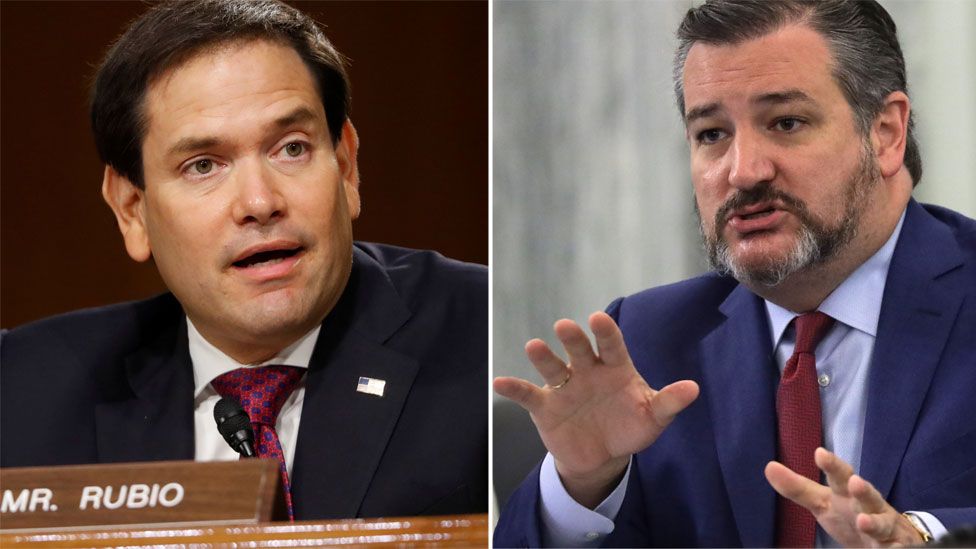Xinjiang: Rubio and Cruz hit with tit-for-tat China sanctions
- Published

China has announced sanctions on top Republicans after the US imposed sanctions on Chinese officials for alleged human rights abuses against Muslim minorities in Xinjiang province.
Among those targeted are senators Ted Cruz and Marco Rubio, both outspoken critics of China.
The nature of the sanctions is unclear.
China is accused of detaining more than a million Uighurs and others in Xinjiang but China denies abuses in the far-western region.
Ted Cruz is a senator for Texas while Marco Rubio represents Florida. The pair competed with Donald Trump for the Republican presidential nomination in 2016.
China also imposed sanctions on Republican congressman Chris Smith; Ambassador-at-Large for International Religious Freedom Sam Brownback; and a government agency, the US Congressional-Executive Commission on China.
The foreign ministry said the move was in response to America's "wrong actions".
"We urge the US to immediately withdraw its wrong decision, and stop any words and actions that interfere in China's internal affairs and harm China's interests," spokeswoman Hua Chunying said.
She gave no details what the sanctions entailed but added: "China will make a further response depending on the development of the situation."
Last week the US imposed sanctions on a number of Chinese politicians who it says are responsible for human rights violations against Muslim minorities in Xinjiang.
The BBC visits the camps where China’s Muslims have their "thoughts transformed"
Announcing the measures, US Secretary of State Mike Pompeo said the US was acting against "horrific and systematic abuses" in Xinjiang.
Officials, including Communist Party boss Chen Quanguo, seen as the architect of Beijing's policies against minorities, were hit with a visa ban and freeze on their US assets.
Relations between the US and China are already strained over a number of issues, including trade, the coronavirus pandemic and China's introduction of a controversial security law in Hong Kong.
What is China doing in Xinjiang?
Rights groups say up to a million Muslims have been detained in high-security prison camps across Xinjiang province.
Last year, the BBC saw leaked documents showing that 15,000 people from southern Xinjiang were sent to the camps in one week alone.
The same documents showed inmates could be released only when they "understand deeply the illegal, criminal and dangerous nature of their past activity".
The Chinese authorities say the Uighurs are being educated in "vocational training centres" in order to combat violent religious extremism.
However evidence shows many are being detained for simply expressing their faith - for example, praying or wearing a veil - or for having overseas connections to places like Turkey.
The BBC's John Sudworth meets Uighur parents in Turkey who say their children are missing in China
Uighurs, who are mostly Muslim, are ethnically Turkic and make up about 45% of Xinjiang's population.
Last month a report by China scholar Adrian Zenz found China was forcing women in Xinjiang to be sterilised or fitted with contraceptive devices.
The report has prompted international calls for the United Nations to investigate.
- Published29 June 2020
- Published17 February 2020